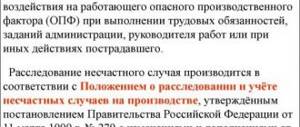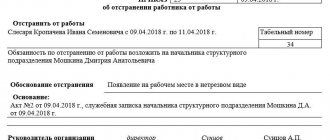What is suspension from work
Labor law standards determine management's removal of an employee from work in the form of preventing this person from performing his job duties for reasons specified in the Labor Code of the Russian Federation.
This event does not imply immediate termination or change of the current agreement with the employee. That is, the suspension is temporary. Although it is possible, after the employee is suspended, to hold him accountable for a disciplinary offense in the form of dismissal.
In this case, the reasons can be of a very diverse nature. Nevertheless, they are united by the main goal of this event - to prevent the employee from causing harm to himself and everyone around him.
It is important to distinguish between suspension from work and events such as absenteeism and downtime. It is carried out on the basis of an order issued by the employer. According to the provisions, removal from work is the responsibility of the administration of the business entity. It cannot in any way be considered a right, since all its cases are listed in the norms, and it cannot simply be applied.
Important! Also, suspension from work is not a disciplinary sanction. According to the rules, an employee suspended from work retains his job, but wages are not calculated or paid.
Only the time of suspension due to the employee’s failure to complete training and a medical examination through no fault of the employee is paid. Removal is carried out by the company's management, competent authorities and other persons entitled to do so.
Grounds and reasons
The following legal grounds can be identified on which a company employee can be suspended from work. All of them are listed in the Labor Code of the Russian Federation.
At the initiative of the employer
When an employer is obliged to remove an employee from work is strictly defined in the Labor Code of the Russian Federation. He does not have the right to use other grounds for temporarily releasing an employee from his duties, even if they are stated in his local regulations. Otherwise, removal from work at the initiative of the employer will be considered a violation of the law.
For medical reasons
If the employer sees that the employee’s health condition does not allow him to work, then he can send him to undergo a medical examination, and after receiving a medical report, remove him from work for medical reasons. The employee must use this time to conduct additional medical examinations.
Attention! After receiving the final results, this employee, based on a medical report, can be transferred to another job that suits his health condition. If the employer does not have it, then the employment contract with such an employee is terminated.
Due to appearing at work while intoxicated
If an employee appears at the workplace in a state of intoxication (alcohol or drugs), the employer must first record the fact that this person is in this state, and then remove him from work.
Only a doctor can confirm the presence of such a condition. It is important to remember that the appearance of an employee in such a state is a disciplinary offense, for which the administration may take appropriate measures.
Important! In the absence of a doctor, intoxication can be confirmed using the testimony of two independent witnesses. It is very important to correctly draw up all the necessary documents.
Failure to pass a medical examination
In strictly defined situations, workers must undergo medical examinations. Employers should ensure that their employees undergo such follow-up medical examinations periodically.
If the employee refuses this, then the administration has the right to remove him from work until he passes the necessary medical examination.
Such medical examinations, as well as mental examinations, are carried out at the expense of the company administration. Admission to work is permitted after the person presents a medical certificate.
Failure to undergo training and testing of knowledge of labor protection
Safety precautions in an enterprise require that the employee periodically undergo training and testing to determine the degree of his knowledge in this area.
Thus, a new employee cannot be allowed to work until he has undergone safety training.
At the same time, the employee’s knowledge of labor protection must be checked on a commission basis. If he does not pass this test, the employer must remove him from work. Within one month, they must re-pass the relevant standards.
Attention! Suspension includes both a training period and a testing period.
Contraindications for performing labor functions according to TD
Based on the results of the medical examination, the employee may be given a contraindication to perform duties at the current place for medical reasons. According to the Labor Code, an employee can be transferred to another position where there are no contraindications to work.
You might be interested in:
Work injury: classification, severity, compensation, employer liability
But this can only be done with the consent of the employee. If there is no position or the employee does not agree, and the transfer period is less than 4 months, then the employee must be suspended for this period while retaining his job.
If the transfer period is more than 4 months or permanent, but there is no suitable position in the organization, then the employment contract between the parties is subject to termination.
Removal at the request of authorized officials
The Code provides for the removal of an employee if this requirement is put forward by regulatory authorities:
- Labor Inspectorate;
- Specialized supervisory services (technical supervision, sanitary and epidemiological supervision, etc.);
- By the tribunal's decision.
Attention! After receiving the order, the employer must carefully study its text. In the case where the document does not contain a requirement for removal, but a recommendation, it is made at the discretion of the employer.
Suspension for the duration of an internal investigation
A complete list of reasons for which an employee can be suspended is indicated in Art. 76 TK. There is no such reason as suspension for the period of an official investigation, or due to loss of confidence.
Therefore, removal for this reason would be illegal. However, this rule does not apply to civil servants, whose removal is permitted on the basis of Art. 32 No. 79-FZ dated July 27, 2004 “On the state civil service of the Russian Federation.”
Some nuances
If an employee is under the influence of alcohol or drugs, he must undergo a medical examination. Otherwise, the removal will be considered illegal. Only with a doctor’s conclusion does the manager have the right to take such an action. However, the Labor Code of the Russian Federation leaves the issue of dismissal at the discretion of the employer, since after an offense this is an optional sanction.
If there are problems with the medical report, the person is offered other positions in the enterprise. Suspension is carried out only if there is no possibility of a change of place or if the employee refuses to transfer.
For the entire period, the employee retains his first position. During the period of suspension, the employee is not paid a salary and is not accrued vacation time. The employer does not make contributions to the Social Insurance Fund and the Pension Fund.
If a person is sure that he was suspended illegally, then he has the right to challenge the decision in court. In case of a positive outcome, the employer will be obliged to pay in full for the missed days and make all payments. The length of service is also restored.
Procedure for registering suspension from work
Employee Notification
In order to confirm the fact that the employee is aware of his removal from work duties, and is also familiar with the reason for this event, a notification is issued. It is drawn up in writing in free form, usually letterhead is used for this purpose.
The notification must include:
- Full name and position of the employee being suspended;
- Information about the reason for removal;
- Start and end dates of suspension or conditions of access to work;
- Information about the deprivation or retention of earnings for the duration of the suspension.
At the bottom of the document there should be a field in which the employee will sign to confirm that he/she has read the message.
Attention! If the employee does not want to receive the notification and sign, then it is necessary to create a commission and, in its presence, read the text of the order to the employee. After this, the commission draws up and signs a statement of refusal, which is stored along with the notification.
Making an order
The procedure for removing an employee from performing work is a mandatory step that includes issuing an order. This occurs on the basis of available supporting documents.
There is no special form for this document, and no sample is provided, so it can be compiled freely on company letterhead.
As a supporting document, you must use a document that establishes the reason for dismissal from work. This could be a memo, an employee’s refusal (for example, to undergo a medical examination) and other forms.
The order must reflect the following information:
- Full name of the employee who is subject to suspension and the duration of this;
- Grounds for removal from work;
- Details of the documents that served as the basis for removal from work;
- Information on payroll for the period of suspension;
- The period for which the employee is suspended from work;
- If necessary, a person who will perform the duties of the suspended employee during the period of his absence.
The order must be signed by the manager, after which it is handed over to the employee for review. If he refuses to affix an introductory signature, it is necessary to assemble a commission and, in its presence, draw up an act of refusal.
Important! It is also necessary to familiarize the persons mentioned in it with the order - for example, who will replace the employee during his absence.
How is time paid when an employee is suspended from work?
In what cases is payment suspended?
If an employer suspends an employee from work due to his fault (failure to undergo a medical examination, appearing at the workplace while intoxicated), then the calculation and payment of wages is stopped for the entire time that elapses from the moment of suspension until admission to work.
At the same time, if an employee who is accused of committing a crime is suspended from work, then according to Art. 131 of the Code of Criminal Procedure, he can claim a monthly payment of five minimum wages. Federal budget funds are used for this.
When do payments continue?
In the event that an employee was suspended from work due to failure to undergo a medical examination or training and testing of knowledge on labor protection, but this event did not occur through his own fault (for example, the employer did not organize training on time), then he is paid wages as if he was idle. due to the fault of the employer. It is made in the amount of no less than 2/3 of the employee’s regular salary.
Attention! Suspension does not exclude the employee’s ability to perform other work in the organization (except for suspension due to alcohol or drug intoxication). In this case, remuneration is made only for the work performed.
Commentary on Article 76 of the Labor Code of the Russian Federation
1. The commented article deals with cases when the employer is obliged to: - remove an employee from work (if the grounds for this are identified in relation to an employee already admitted to work); - do not allow the employee to work (if such grounds are discovered before the start of his working day (shift)).
The reasons for taking such measures are: - the employee’s appearance at work in a state of alcohol, drug or other toxic intoxication.
According to paragraph 42 of the resolution of the Plenum of the Armed Forces of the Russian Federation on the application by courts of the Labor Code of the Russian Federation, the state of alcoholic or narcotic or other toxic intoxication can be confirmed both by a medical report and other types of evidence. There must be such evidence (in particular, a report drawn up by the commission about the employee’s appearance at the workplace in a state of intoxication).
This circumstance, in addition to removal from work (preclusion from work), may also lead to the dismissal of the employee under paragraph “b” of Part 6 of Art. 81 of the Labor Code of the Russian Federation in order to apply a disciplinary sanction (see Art. 81 of the Labor Code of the Russian Federation and commentary thereto). If dismissal is the right of the employer, then he is obliged to ensure that the employee is removed or prevented from working in any case. This is a requirement related to labor protection, which, according to Art. 209 of the Labor Code of the Russian Federation, is a system for preserving the life and health of workers in the process of work and applies to all employers; — failure by the employee to undergo training and testing of knowledge and skills in the field of labor protection in the prescribed manner. It should be borne in mind here that Art. 214 of the Labor Code of the Russian Federation provides for the obligation of the employee to undergo, firstly, training in safe methods and techniques for performing work and providing first aid to victims at work and instruction on labor protection, and secondly, testing of knowledge of labor protection requirements; — failure by the employee to undergo a mandatory medical examination in the prescribed manner, as well as a mandatory psychiatric examination in cases provided for by the Labor Code of the Russian Federation and other federal laws and regulations of the Russian Federation. Article 214 of the Labor Code of the Russian Federation establishes that an employee is obliged to undergo mandatory preliminary (upon employment) as well as periodic (during employment) medical examinations and other mandatory medical examinations, extraordinary medical examinations at the direction of the employer in those cases provided for by the Labor Code of the Russian Federation and other federal laws.
So, according to Art. 266 of the Labor Code of the Russian Federation, persons under the age of eighteen are hired only after a preliminary compulsory medical examination and are subject to a compulsory medical examination annually until they reach the age of eighteen. Article 330.3 of the Labor Code of the Russian Federation provides that workers engaged in underground work are required to undergo medical examinations, including at the beginning of the working day (shift), as well as during and (or) at the end of the working day (shift).
According to Part 1 of Art. 23 of the Federal Law of December 10, 1995 N 196-FZ “On Road Safety”, it is mandatory to conduct, among other things, pre-trip and ongoing medical examinations of vehicle drivers.
As for the mandatory psychiatric examination of workers, for example, Part 1 of Art. 6 of the Law of the Russian Federation of July 2, 1992 N 3185-1 “On psychiatric care and guarantees of the rights of citizens during its provision” establishes restrictions on the performance of certain types of activities associated with a source of increased danger. A citizen may be temporarily (for a period of no more than five years and with the right of subsequent re-examination) declared unfit, due to a mental disorder, to perform certain types of professional activities, as well as activities associated with a source of increased danger. Decree of the Government of the Russian Federation of April 28, 1993 N 377 “On the implementation of the Law of the Russian Federation “On psychiatric care and guarantees of the rights of citizens in its provision” approved the List of medical psychiatric contraindications for the implementation of certain types of professional activities and activities associated with a source of increased danger. Thus, for working in remote areas and underground such conditions are epilepsy and syncope, for working in gas rescue services - mental illness (including in remission), etc.
For employees for whom there is no obligation to undergo a medical examination (examination), as well as a mandatory psychiatric examination, suspension from work or a ban on admission on this basis cannot be applied; - identification, in accordance with a medical report issued in the prescribed manner, of contraindications for the employee to perform work stipulated by the employment contract (see Article 73 and the commentary thereto); — suspension for a period of up to two months of the employee’s special right - a license, the right to drive a vehicle, the right to carry a weapon, or another special right.
Assignment of such a special right to an employee is carried out in accordance with federal laws and other regulatory legal acts of the Russian Federation.
Thus, Parts 1, 2 of Article 3.8 of the Code of Administrative Offenses of the Russian Federation provide that deprivation of an individual who has committed an administrative offense of a special right previously granted to him is established for a gross or systematic violation of the procedure for using this right. The period of deprivation of a special right cannot be less than one month and more than three years.
It must be emphasized that the commented article refers to the suspension of the employee’s special right for a period of up to two months. In the event of suspension of the special right for a period of more than two months, as well as in the event of its deprivation and expiration, if this entails the impossibility of the employee fulfilling his duties under the employment contract, there should be talk of dismissal of the employee under clause 9 of Art. 83 Labor Code of the Russian Federation.
In practice, most often, suspension from work (prohibition of access to work) is applied to vehicle drivers in the event of deprivation of their right to drive a vehicle in violation of certain traffic rules.
In accordance with Part 1.1 of Art. 32.7 of the Code of Administrative Offenses of the Russian Federation, a driver’s license or a temporary permit to drive a vehicle, which is in the citizen’s hands at the time the resolution imposing an administrative penalty in the form of deprivation of the right to drive vehicles comes into force, must be handed over to the State Traffic Inspectorate unit within three working days , executing this administrative penalty, and in the event of loss of these documents, an application for this must be submitted (directive of the State Traffic Safety Inspectorate of the Russian Federation dated July 13, 2010 N 13/9-529 “Procedure for executing the decision on deprivation of the right to drive vehicles”).
Accordingly, the employee is deprived of the opportunity to perform his labor function. In this case, the employer is obliged to prevent the employee from continuing his work.
In this case, there is a confusion of the concepts of “deprivation” and “suspension” in relation to the so-called “deprivation of rights” to drive a vehicle for a certain period according to the wording contained in the Code of Administrative Offenses of the Russian Federation. It seems, however, that deprivation implies an irrevocable, rather than temporary loss of a right, and when using this concept within the framework of labor law, it should be understood as such.
It is important that in this case the employer is obliged to suspend (not allow to work) the employee only if: 1) this entails the impossibility of the employee fulfilling his duties under the employment contract. Thus, the cassation ruling of the Volgograd Regional Court dated September 29, 2011 in case No. 33-12716/11 declared illegal the order of the head physician of the Ministry of Health, by which the plaintiff, a physical therapy nurse, was temporarily suspended from work due to the lack of an extended certificate in the specialty “physiotherapy” . The court found that the plaintiff had a secondary medical education, had previously undergone specialization and advanced training, and was awarded the highest qualification category in the specialty “physiotherapy.” At the same time, the mere lack of a valid certificate in the specialty (physiotherapy) of a nurse within the meaning of Art. 76 part 1 clause 5 of the Labor Code of the Russian Federation is not a basis for removing an employee from the duties of a nurse; 2) it becomes impossible to transfer the employee with his written consent to another job available to the employer. This can be either a vacant position or work that matches the employee’s qualifications, or a vacant lower position or lower paid job. In any case, it must be work that the employee can perform taking into account his state of health.
Accordingly, the employer, as in other similar cases, must notify the employee in writing of the availability of such vacancies. The employee is provided with a full list of suitable vacancies available to the employer in a given locality (or, if provided for by a collective bargaining agreement, agreements, employment contract - in other localities), or information about the absence of such vacancies at the employer. If the employee agrees to such a transfer, then the issue of removal from work (prohibition of access to work) essentially does not arise, since the employee begins another job for this employer, which does not require a special right. Only if the employee does not agree to the transfer, the employer is obliged to apply the provisions of the commented article on suspension from work (non-admission to work); - requirement of bodies or officials authorized by federal laws and other regulatory legal acts of the Russian Federation.
For example, according to clause 10, part 2, article 29 of the Code of Criminal Procedure of the Russian Federation, the court, including during pre-trial proceedings, has the authority to make decisions on the temporary removal of a suspect or accused from office; - other cases provided for by the Labor Code of the Russian Federation, other federal laws and other regulatory legal acts of the Russian Federation.
In particular, Art. 330.4 of the Labor Code of the Russian Federation establishes that, along with the cases specified in Art. 76 of the Labor Code of the Russian Federation, the employer is obliged to remove an employee from underground work (not allow him to do underground work) in cases of non-compliance with safety requirements when carrying out underground work, the employee’s failure to use personal protective equipment issued to him in the prescribed manner, etc.
Part 2 Art. 5 of the Federal Law of September 17, 1998 N 157-FZ “On Immunoprophylaxis of Infectious Diseases” establishes that the lack of preventive vaccinations entails the removal of citizens from work, the performance of which is associated with a high risk of contracting infectious diseases.
To remove an employee from work (preventing him from working), the employer issues a corresponding order in any form, indicating the grounds and attaching supporting documents.
2. The period of suspension of the employee (preclusion from work) coincides with the period of the circumstances that served as the basis for the application of this measure. Once such circumstances are eliminated (compulsory medical examination, necessary training in the field of labor protection, etc.), the employee can continue working. Otherwise may be provided for by the Labor Code of the Russian Federation and other federal laws.
During the entire period of suspension from work (preclusion from work), the employee’s wages are not accrued. In the corresponding column of the working time sheet, the time of the employee’s absence from work or absence from work is entered.
Exceptions are cases provided for by the Labor Code of the Russian Federation or other federal laws. As a rule, such exceptions are typical for the civil service.
For example, according to Part 2.1 of Art. 32 of the Federal Law “On the State Civil Service of the Russian Federation”, a civil servant may be removed from the position he replaces in the civil service (not allowed to perform official duties) for a period not exceeding 60 days from the date of the decision to resolve a conflict of interest or to conduct an audit, while retaining the monetary content.
In cases where an employee was suspended from work due to the fact that he did not undergo training and testing of knowledge and skills in the field of labor protection or a mandatory medical examination through no fault of his own (for example, due to the fact that the date of the medical examination coincided with period of his temporary incapacity for work), he is paid for the entire period of suspension from work as idle time.
Thus, from the appeal ruling of the Moscow City Court dated October 12, 2012 in case No. 11-10444, it follows that the obligation to pay for downtime of an employee who has not undergone a medical examination arises if the employer has not fulfilled the obligation assigned to him to organize medical inspection, after which he did not allow the employee to work on this basis.
Admission after suspension
An employee may be allowed to work after the circumstances that caused the suspension have ended. If the suspension order did not specify a specific time period, then in order to be allowed to work it is necessary to issue a new order and familiarize the employee with it against signature.
You might be interested in:
Dismissal of a pregnant woman: in what cases is it legal, in what cases is it not, responsibility, procedure
There is no standard form for such an order, so it can be drawn up in any form.
If the suspension was issued for a specific period, then there is no need to draw up a separate order for admission.
An entry about the period of suspension is usually not made on the personal card. At the same time, it is recommended to do this in the “Additional information” section, since such information will be needed when determining the length of service for the purpose of granting paid leave.
Nuances of the grounds
Nuances when removing a foreign employee
The Labor Code establishes in Article 327.5 additional criteria, upon the occurrence of which the organization is obliged to remove a foreigner from work:
- Suspension of a permit issued to an organization to employ foreigners or expiration of its validity;
- Expiration of the validity period of a work permit in Russia or a patent;
- Completion of the period of validity of a temporary residence permit in the country;
- Completion of the period of validity of a residence permit in Russia;
- Completion of the validity period of a policy or voluntary health insurance agreement.
If one of the permits expires, the employer is obliged to formalize the removal of a citizen of a foreign country from work on a general basis.
Attention! The start date of the suspension will be the day after the day the document expires. If re-registration is not carried out within 1 month from the date of removal, then the employment contract is subject to termination on the basis of Art. 327.6 Labor Code of the Russian Federation.
Illegal removal
Additional reasons
Article 76 of the Labor Code of the Russian Federation with commentaries for 2021 provides for the possibility of temporary termination of professional activities. This applies to stateless foreigners. If they have run out of patents, residence permits and other documents confirming the legality of their stay in the country, then they cannot work.
An important basis for removal from work is refusal to comply with safety precautions and use personal protective equipment.
This refers to workers who carry out their activities underground .
The reason for suspension is being drunk or under the influence of drugs. Teachers and other persons associated with children can receive a temporary ban on activities. If a criminal case has been opened against them, then they cannot carry out professional activities until a court decision.
In Art. 76 of the Labor Code of the Russian Federation does not provide for specific periods of removal. It all depends on the specifics of the current situation . In most cases, it is enough to eliminate the cause of the non-admission. For example, if the issue is the absence of a medical examination, then the employee only needs to undergo it and receive a supporting document.
In what cases is removal unlawful?
Unlawful dismissal from work will be considered as such in the following circumstances:
- The reason chosen for removal was not contained in Article 76 of the Labor Code of the Russian Federation. In fact, this list is closed and cannot be expanded. Also, you cannot be suspended on the grounds specified in the internal regulations of the organization.
- The employer does not comply with the mandatory procedure. In particular, the employee may not be familiar with the order of dismissal against signature, which deprives evidence of the legality of the dismissal;
- Suspension was used by the employer as a disciplinary sanction, which contradicts the types of punishments specified in the Labor Code of the Russian Federation. This list is also final and cannot be expanded at the request of the employer.
Regulations under the Labor Code of the Russian Federation
In accordance with the provisions of the law, namely Art.
76 of the Labor Code of the Russian Federation, the head of an enterprise or the head of a department has every right to not allow an employee to perform direct duties if there is reason to believe that for some reason he will not cope with the assigned tasks, or circumstances have arisen that have become an obstacle to access to the worker place. In particular, an employee may be suspended in the following situations:
- appearing at the enterprise during working hours in a state of intoxication, both alcoholic and narcotic;
- those who have not passed a mandatory medical examination in accordance with the established rules specified in local acts or federal legislation;
- refusal or failure to complete training in occupational health and safety regulations;
- for medical reasons with an established ban on performing certain types of work or workload;
- suspension or cancellation of a license to perform certain types of work;
- if there is an order from authorized persons to remove the employee from performing duties.
If a worker is removed from work, no payment is made, because he does not fulfill his duties.
In exceptional cases, his average earnings may be retained, but only if there is evidence that the reason was the enterprise itself. The procedure for this action according to the Labor Code of the Russian Federation is discussed in the following video:
How to express disagreement with a management decision
If an employee does not agree with his dismissal and considers it unlawful, first of all it is necessary to contact the employer in writing and provide evidence of his innocence.
In addition, the document can express the following requirements:
- Cancel the issued order of removal;
- Reinstate in the workplace if the result of the suspension was dismissal;
- Change the entry in the work book if a dismissal has been made.
- Pay the amount of average earnings for downtime that arose due to the fault of the employer.
Important! The application is made in two copies, one remains with the employer, and the second must be marked with receipt. You can also send the document by mail with notification of receipt (if it is located far from your place of work).
Legal consequences
Depending on the severity of the situation, for an employee, suspension from work may result in:
- Resuming work as before after eliminating the obstacles.
- By decision of the administration and with the consent of the employee, transfer to another position (for medical reasons).
- Termination of the employment contract.
The employee may not agree with the employer's decision to suspend. In this case, he must contact him with a written statement in which he should set out his arguments. In it, he may demand compensation for the period of forced downtime due to the fault of the employer, and reinstate him in the workplace. The application is drawn up in two copies. When submitting an application, you must ask to put the incoming registration number on your copy.
If the administration does not respond to the employee’s appeal, he has the right to go to court to restore his rights.
Judicial practice on this issue
Employers often make mistakes when removing an employee, but they need to prove they are right.
Therefore, the legal framework on this issue is extensive, and the court often takes the employee’s side:
- The employer suspended the employee from work due to the discovery of a shortage. The court declared this suspension illegal, annulled the order issued regarding this event and decided to pay the employee a fee for forced downtime due to the fault of the employer;
- The employee was suspended from work due to the discovery of fuel theft from a warehouse. The employer issued an order for dismissal, but did not familiarize the employee with it. The court declared the dismissal illegal, since the specified reason was not included in the list provided for by the Labor Code of the Russian Federation. In addition, the employer violated the dismissal procedure, since the document was not reviewed, vacant positions or transfer to another job were not offered;
- The employee was suspended due to his failure to undergo a mandatory medical examination. The dismissal was declared illegal by the court because the employer did not properly organize the inspection, and the referral to undergo the procedure was actually issued after the dismissal order was issued.
- The employee was suspended for work violations as a punishment. The court declared this suspension illegal, since this type of punishment is not provided for by the Labor Code of the Russian Federation.
Consequences of illegal removal for management
In case of illegal deprivation of an employee’s opportunity to work, the employer faces liability:
- Material - the employee must be paid compensation for all the days when he was deprived of the opportunity to perform work duties.
- Administrative - punishment is imposed by regulatory authorities in accordance with Article 5.27 of the Code of Administrative Offenses, a fine of 1-5 thousand rubles for an official, a fine of 1-5 thousand rubles for an entrepreneur, 1-5 thousand rubles for a company, 30-50 thousand rubles for a company.
Attention! If an employee goes to court to protect his rights, he may also be required to pay compensation for moral damage. Its amount is usually set by the court based on the severity of the violation committed.










